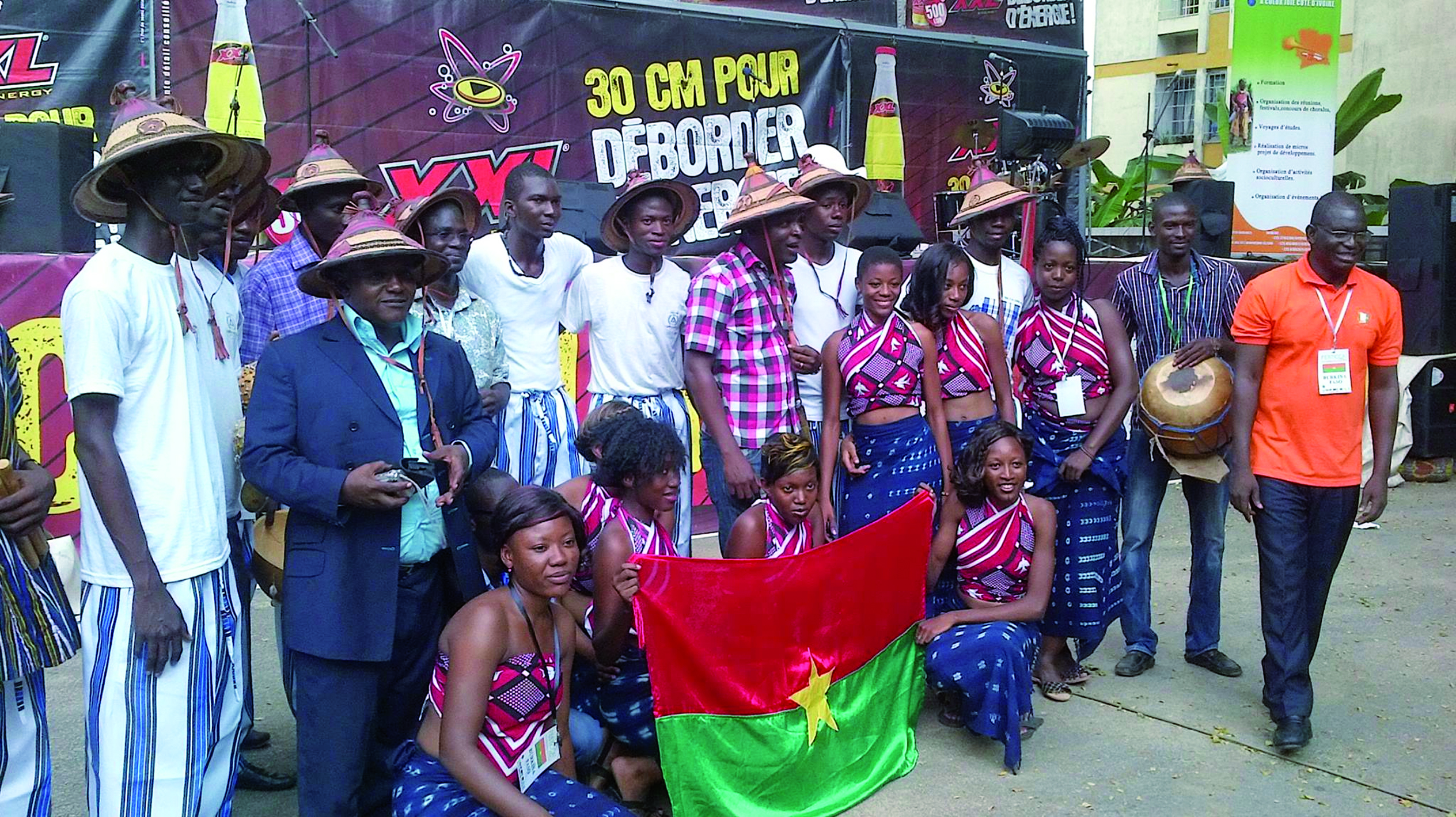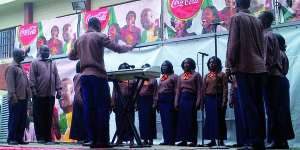By Henri Pompidor, choral conductor and teacher
Translated by Anita Shaperd, USA
Organized by the ACJ Federation of Ivory Coast, the Second International Festival of Choral Music (FESTICCA 2014) was held last July 31-August 4 in the capital city of Abidjan. Once again demonstrating the dynamism of choral music on the African continent today, particularly in West Africa, many choirs responded to the ACJ national federation’s invitation: from Ivory Coast itself, as well as from the neighboring countries of Togo, Burkina Faso, Ghana, and Republic of the Congo. The event, unique in the sub-Saharan region, allowed the various choirs in attendance to participate in workshops and meetings on the topics of choir direction, vocal training, traditional song repertoires, choir organization and fund-raising. Each evening, diverse vocal groups presented a concert in a spirit of cultural exchange and friendship. A competition, during which each choir put its best face forward before an international jury, marked the brilliant finale of these encounters.
Such meetings among West African countries have been taking place regularly for several years, with keen success in French-speaking as well as Anglophone circles. They are a sign of the integration and dynamism of the African continent in international choral music. African countries’ interest in this musical discipline is increasing. In Ivory Coast, which organized the event, dynamic groups abound — church choirs, school and university choirs, secular choirs — each gathering many singers, of all ages and social backgrounds. The ACJ Federation, energetically directed by its president Oliveri Pascal Koua, unites these different musical formations in a collective spirit of mutual aid, exchange and solidarity.
The second FESTICCA was indeed clearly guided by this sensibility. The singers and choir directors in attendance were able to meet and share their experiences. They also expressed their needs for training in directing techniques, activity management, and the organization and financing of concerts. Because of this, the three days of morning workshops were followed with much interest, many questions, and passionate debates – notably on how to improve choirs’ vocal quality and increase their musical activity. The encounters and exchanges between choir directors created bonds of friendship that will bear fruit for years to come.
The traditional opening evening allowed delegations to be introduced. Three choral concerts were scheduled for the evenings that followed, each on one of the principal festival themes:
- The first was devoted to cultural encounters and respect for diversity. Several choirs presented lively and nuanced traditional songs. These sung and danced pieces, accompanied by percussion instruments, underlined the importance of the tribal origins of most of these countries’ choral traditions. Traditional songs, most often transmitted orally, represent the very source of their choral music. Collective singing as it still exists today is closely connected to the foundations of African society. Linked to the main activities of indigenous tribes’ religious and secular life, it was one of the earliest social institutions to develop on the continent. It possesses particular resonance in how a society understands its most essential mythical origins and functions. Choral singing lies at the heart of tribal life in Ivory Coast, Togo and Ghana, accompanying all rites of passage and carrying within itself the values on which the social group is founded. Supplemented by words, music readily enters all aspects of daily life, accompanying the seasons and reinforcing the customary ties that constitute a group’s strength and equilibrium. The festival promotes a kind of rebirth of traditional linkages that have occasionally been weakened since the emergence of industrial society and urbanization. It preserves a very important musical patrimony and, for many African singers, creates conditions for a new musical practice that also embodies values of tolerance and connectedness.
- The two other evenings were devoted to fostering friendships between people through the practice of singing. The meetings thus set the stage for the creation of strong and lasting bonds between participating nations. The concerts all ended quite late in the night, with the sounds of traditional danced and sung music most often taken up by all participants.
- The grand finale of FESTICCA 2014 took place on the last evening: the traditional choral competition bringing together all participating countries. Most of the groups present competed for two prizes: in classical and in traditional singing. In the classical category, each group presented two choral pieces, one required (“O Vos Omnes” by Vittoria, from the Renaissance musical repertoire) and another of their own choosing. The traditional song competition was much more freely oriented towards the choral traditions of each group. The international jury, comprised of four choir directors, three of African origin, recognized the quality of work accomplished. The musical and artistic level was overall quite satisfactory. Choirs performed the classical and traditional pieces with confidence. Several prizes were awarded: two in the classical category, to the African Youth Choir (from Ghana) and to Vox Angelica (Ivory Coast), and to Kekeli and the Seraphim (Togo) in the traditional category. However, the jury regretted the fact that musical groups did not adequately display musical precision and their singers’ vocal training. Frequent problems of tonal quality were apparent (repeatedly going flat during a performance). Choir directors must therefore be vigilant about better preparing their groups to achieve the level required in competition, particularly with regard to a cappella Appropriate exercises to ensure vocal precision and attentiveness to intervals should resolve the problem. More attention must also be paid to diction. Moreover, a better vocal balance between the main and intermediate voices would improve the groups’ intonation. We should note that throughout these festival days, the importance of precision in the execution of choral music was made clear. Choir direction is another of the areas in which African choirs wish to make improvements.
The Ivorian Federation of Choral Music has already acknowledged the importance of these issues by recently creating an academy of vocal music in Abidjan, which offers training to all choir directors from different regions of Ivory Coast (and beyond). The national association should not stop there, however, because it has also announced its intention of organizing a new festival in two years’ time – the third FESTICCA – to be held in Abidjan in late July or early August 2016. This next festival will no doubt see the arrival of numerous other delegations from West Africa, as well as from Northern Africa and perhaps even Europe – even from France. We hope these initiatives are realized and succeed, so that high-quality choral practices remain alive and thrive in sub-Saharan Africa.
Website of the ACJ Federation – Ivory Coast : http://acoueurjoie-ci.com/
The ACJ Federation – Ivory Coast invites all choirs throughout the world to attend the next International Festival of Vocal Music in Abidjan – FESTICCA 2016.
For all information, contact M. Olivier Pascal Koua, President of the ACJ Federation – Ivory Coast. Email angouapascal@yahoo.fr. Telephone 00 225 07 16 57 06


